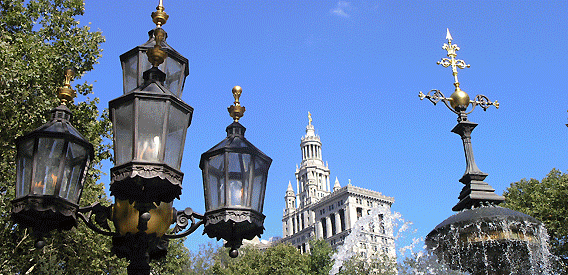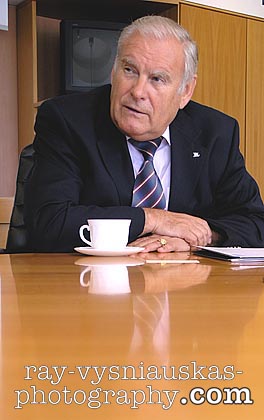
Contact: |
|
|
|
||
|
||
Bronislovas Lubys is the President of Achema Group, one of the largest and most diverse companies in Lithuania today. Achema is probably best known as a chemical company, but only 1,300 of their 5,300 workers are directly employed at the Achema plant. The conglomerate also includes logistics and transport, media and publishing, construction, finance, hotels, mining and security companies. Although Bronislovas is President of the Confederation of Lithuanian Industrialists, he is more than just an industrialist, he played a major role in Lithuania on both sides of independence, in business as well as in politics, so he offers a unique perspective on the changes that have taken place in Lithuania. We spent a couple of hours with Bronislavas at the Achema headquarters in Jonava where we spoke about the changes in Lithuanian society. History I received my doctorate from Kaunas University and started working at the Achema plant as a young specialist straight out of university, so excluding my time in parliament I have been here all my working life. Achema was privatised in 1994, an ancient Soviet-era plant that was in great need of readjustment and renovation, and we have worked hard to turn the plant into a modern competitive facility that can pay its way in the West. First there was the problem of operating under Soviet cost structures and the end of captive markets in the USSR, but in those first years we concentrated on rationalising the company, the next step was to modernise and realign, and now we are looking for more ecologically friendly products to take us into the future. The plant specialises in calcium nitrate which is a new product for this part of the world and is mainly used as a fertiliser. We are now exporting 600,000 tons per year, even shipping to China. We also produce liquid fertilisers and because of the increasing export we bought Klasco, a stevedoring company in Klaipeda and built new terminals for the loading and unloading of chemicals. Beyond Achema we have a conglomerate of over 40 companies, many of which have been working for decades and have their own history, and we needed to establish strong manufacturing and trading companies to help us move into new markets. There were tough times in the 1990s with the banking collapse and the Russian crisis, but we kept to our plan and now we are well set to continue our growth into the EU. Germany, France, Belgium and the UK are our main markets with Denmark and Sweden on the rise. We export 1,400,000 tons per annum, and as a group we have a turnover of US$700 million. We are always looking to diversify further and have recently purchased 50% of a small company in Germany called Agrobalt, as well as some smaller companies in Sweden and Belgium, and so slowly we are moving into the EU. Politics I entered parliament in 1989 because it was my belief that everyone had a responsibility to pitch in and help where they could. I was honoured to be a signatory to the Declaration of Lithuanian Independence and served as Prime Minister for a short while. It was an exciting time that was the culmination of the lovely ‘Singing Revolution’. But once I had a chance to return to my business I took it. I realised that politics was not for me, and that I had done all that I could, so I was relieved to return to my work here. I went back to lecturing at university as well, which I missed. There is still some work needed to restructure government and it is noticeably easier to work with governments in the West than in the former Eastern Block. We need to be faster, better and more efficient. There is still a lot that needs to be done before what is normal in Germany becomes normal here. There was a problem that the government gave a lot of our resources to foreigners and not to the locals. The sale of Mažeikių Nafta for example was a bad decision and that is acknowledged now. We are in danger of becoming like Africa where countries fight to regain the rights to their own resources from being exploited by others, but with a bit of luck we will get them back. Maybe the foreigner always looks nicer than what you are used to at home, but it is not always best for the country. But you still have to be positive. All figures and economic statistics point to a growing economy and we have to rejoice in that, but joining the EU has also brought new problems. Sugar will be a similar problem to textiles in the near future, and two Lithuanian companies have already closed down. Business Bronislovas Lubys was in the ideal situation to compare life both sides of independence. In the early days there was a big need to readjust. We were used to having fixed prices and assured markets and all the sudden we had to compete on all levels. The situation was a bit different with Russia because we could only buy raw materials from them because we are not allowed to sell them fossil products, but I can’t say that everyone in the West is nice either. We learned a few hard and very expensive lessons where we lost a lot of money, but you have to pay for these lessons, and we learned well and now we know who we can trust. We had a lot to learn in those days because they didn’t teach us those things at university, and we have large investments to protect, and are now one of the major players in Lithuania. Business is growing in all sectors, but with a lot of questions because a lot of EU directives are not yet implemented. It is harder for us to work with them as we change our practices and adjust to procedures we are not used to. There needs to be a bit more direction from government. I asked if he found more respect in politics or business: I wouldn’t like to say. I have always managed to communicate easily with everyone, whether business or political leaders or public or workers, so I have always been grounded and don’t see any difference. Society Generally I believe everything will be alright, but life has its own rules and while we can now wave the flag and sing the anthem and go to church, there are many mental aspects of the change that are a lot slower to take effect. With socialism we had a lot of money but no goods to buy, and capitalism offers the opposite; now people are equal democratically, but the money and wages are not the same. There also needed to be a big change in mentality, in those days everything belonged to the Soviets, so taking things from work wasn’t stealing, it was just taking it from one corner of the Soviet to the other. And the courts were friendly because everyone knew that they might one day be in the same situation so a lot of things were overlooked - people miss the comfort of those times. Now they get more, but they have lost a lot of things which they were used to, and although there are some that say things were better before, once you sit down and talk to them and remind them of what they have now, then nearly all admit that things really are better now. I am wealthy but I took the risks, I was the one that took out the loans and couldn’t sleep at night with the worry. But people generally weren’t ready for the changes of independence, they still thought it would be the same as under the old system where it didn’t matter if you did or didn’t work, you would still have a job and get paid the same and that you could still even drink on the job, but now we all have to compete for work in an open market. In those days I had a house and a car, and I couldn’t have any more because there was nothing else to have. The future Our total GDP is the problem. In Germany workers are paid in Euros what Lithuanians earn in Litas, even though at the top it is already getting to be much the same, but the majority of workers are still a long way behind their EU cousins. Some forecast another 20 to 25 years before we can be level with other countries that have been part of the West all the time, so it is generally agreed that we have a long way to go. Still, some of our current problems might be because we compare ourselves to Germany instead of say Belarus. We say that we have achieved a lot in these first 15 years of independence, but there was a lot more achieved from 1919 to 1939 in Lithuania under Smetonas than we have managed so far, though for the first 10 years after Lithuania broke away from the Soviet Union there was negative growth. Part of the problem at the moment is that everyone is in a hurry and we want to earn a wage like Germans, but work like Russians. We have the mental things but now they want the fruits of that labour. I believe in the Lithuanian people and know that in the future, with the help of business and government, we will create a new and prosperous business culture that will be reflected in our society. |
||

